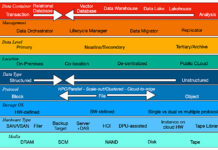ReRAM developer Weebit Nano has signed a deal with US-based Skywater to bring its technology into volume production.
Weebit’s ReRAM is a silicon-oxide material with electrical resistance set high or low by the presence or absence of silicon crystal filaments. The two resistance states signal binary one or zero. The resistance states are stable, making this ReRAM non-volatile, and state changes are faster than NAND writes, making it a storage-class memory tech. The technology has much longer endurance over write cycles than NAND as well, and needs less electricity to operate.

Weebit’s CEO Coby Hanoch supplied an announcement quote: “Our technology, which is highly efficient and extremely robust, is enabling greater performance and lower-power memory solutions for a range of new electronic devices. We look forward to collaborating with SkyWater — starting immediately — to ensure smooth technology transfer to their US production fab.”
Skywater is a so-called technology foundry for integrated circuit volume manufacturing. Its fab was originally set up by Minnesota-based Control Data Corporation in the 1980s, acquired by Cypress Semiconductor in 1991, and spun off into Skywater in 2017.
SkyWater and Weebit will jointly transfer Weebit’s ReRAM technology to SkyWater’s production fab and qualify it for volume manufacturing. Once that’s done, SkyWater intends to offer it to customers as embedded, non-volatile memory (NVM) IP on the company’s 130nm CMOS process.
Application areas include analog, power management, automotive, IoT and rad-hard designs. Weebit’s ReRAM is said to be cost effective, have enhanced endurance and retention at high temperature ranges, tolerant to radiation and electromagnetic fields, and cause zero interference with front-end-of-line (FEOL) analog components.
Skywater has licensed Weebit IP for use with customer designs.
If Weebit’s ReRAM becomes applicable for general use in servers then it could be the first real competitor to Intel’s Optane 3D XPoint technology to become available that is not a pseudo-NAND product — like Samsung’s Z-SSD. But we are a long way from this situation, and MRAM is being developed as well by Spin Memory and EverSpin. The EverSpin tech is available now and used as an SRAM replacement tech.








